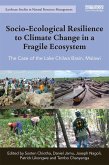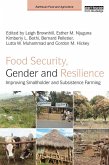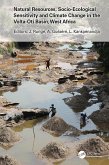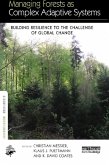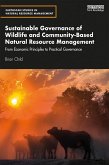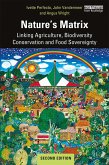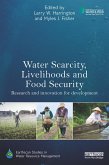Socio-Ecological Resilience to Climate Change in a Fragile Ecosystem (eBook, PDF)
The Case of the Lake Chilwa Basin, Malawi
Redaktion: Chiotha, Sosten; Chanyenga, Tembo; Likongwe, Patrick; Nagoli, Joseph; Jamu, Daniel
42,95 €
42,95 €
inkl. MwSt.
Sofort per Download lieferbar

21 °P sammeln
42,95 €
Als Download kaufen

42,95 €
inkl. MwSt.
Sofort per Download lieferbar

21 °P sammeln
Jetzt verschenken
Alle Infos zum eBook verschenken
42,95 €
inkl. MwSt.
Sofort per Download lieferbar
Alle Infos zum eBook verschenken

21 °P sammeln
Socio-Ecological Resilience to Climate Change in a Fragile Ecosystem (eBook, PDF)
The Case of the Lake Chilwa Basin, Malawi
Redaktion: Chiotha, Sosten; Chanyenga, Tembo; Likongwe, Patrick; Nagoli, Joseph; Jamu, Daniel
- Format: PDF
- Merkliste
- Auf die Merkliste
- Bewerten Bewerten
- Teilen
- Produkt teilen
- Produkterinnerung
- Produkterinnerung

Bitte loggen Sie sich zunächst in Ihr Kundenkonto ein oder registrieren Sie sich bei
bücher.de, um das eBook-Abo tolino select nutzen zu können.
Hier können Sie sich einloggen
Hier können Sie sich einloggen
Sie sind bereits eingeloggt. Klicken Sie auf 2. tolino select Abo, um fortzufahren.

Bitte loggen Sie sich zunächst in Ihr Kundenkonto ein oder registrieren Sie sich bei bücher.de, um das eBook-Abo tolino select nutzen zu können.
This book provides a review of the Lake Chilwa Basin Climate Change Adaptation Programme research study, based on the ecosystem approach.
- Geräte: PC
- ohne Kopierschutz
- eBook Hilfe
- Größe: 21.57MB
Andere Kunden interessierten sich auch für
![Socio-Ecological Resilience to Climate Change in a Fragile Ecosystem (eBook, ePUB) Socio-Ecological Resilience to Climate Change in a Fragile Ecosystem (eBook, ePUB)]() Socio-Ecological Resilience to Climate Change in a Fragile Ecosystem (eBook, ePUB)42,95 €
Socio-Ecological Resilience to Climate Change in a Fragile Ecosystem (eBook, ePUB)42,95 €![Food Security, Gender and Resilience (eBook, PDF) Food Security, Gender and Resilience (eBook, PDF)]() Food Security, Gender and Resilience (eBook, PDF)46,95 €
Food Security, Gender and Resilience (eBook, PDF)46,95 €![Natural Resources, Socio-Ecological Sensitivity and Climate Change in the Volta-Oti Basin, West Africa (eBook, PDF) Natural Resources, Socio-Ecological Sensitivity and Climate Change in the Volta-Oti Basin, West Africa (eBook, PDF)]() Natural Resources, Socio-Ecological Sensitivity and Climate Change in the Volta-Oti Basin, West Africa (eBook, PDF)44,95 €
Natural Resources, Socio-Ecological Sensitivity and Climate Change in the Volta-Oti Basin, West Africa (eBook, PDF)44,95 €![Managing Forests as Complex Adaptive Systems (eBook, PDF) Managing Forests as Complex Adaptive Systems (eBook, PDF)]() Managing Forests as Complex Adaptive Systems (eBook, PDF)52,95 €
Managing Forests as Complex Adaptive Systems (eBook, PDF)52,95 €![Sustainable Governance of Wildlife and Community-Based Natural Resource Management (eBook, PDF) Sustainable Governance of Wildlife and Community-Based Natural Resource Management (eBook, PDF)]() Brian ChildSustainable Governance of Wildlife and Community-Based Natural Resource Management (eBook, PDF)46,95 €
Brian ChildSustainable Governance of Wildlife and Community-Based Natural Resource Management (eBook, PDF)46,95 €![Nature's Matrix (eBook, PDF) Nature's Matrix (eBook, PDF)]() Ivette PerfectoNature's Matrix (eBook, PDF)42,95 €
Ivette PerfectoNature's Matrix (eBook, PDF)42,95 €![Water Scarcity, Livelihoods and Food Security (eBook, PDF) Water Scarcity, Livelihoods and Food Security (eBook, PDF)]() Water Scarcity, Livelihoods and Food Security (eBook, PDF)52,95 €
Water Scarcity, Livelihoods and Food Security (eBook, PDF)52,95 €-
-
-
This book provides a review of the Lake Chilwa Basin Climate Change Adaptation Programme research study, based on the ecosystem approach.
Dieser Download kann aus rechtlichen Gründen nur mit Rechnungsadresse in A, B, BG, CY, CZ, D, DK, EW, E, FIN, F, GR, HR, H, IRL, I, LT, L, LR, M, NL, PL, P, R, S, SLO, SK ausgeliefert werden.
Produktdetails
- Produktdetails
- Verlag: Taylor & Francis eBooks
- Seitenzahl: 292
- Erscheinungstermin: 13. Juni 2018
- Englisch
- ISBN-13: 9781351057097
- Artikelnr.: 56837611
- Verlag: Taylor & Francis eBooks
- Seitenzahl: 292
- Erscheinungstermin: 13. Juni 2018
- Englisch
- ISBN-13: 9781351057097
- Artikelnr.: 56837611
- Herstellerkennzeichnung Die Herstellerinformationen sind derzeit nicht verfügbar.
Sosten Chiotha is the Regional Programme Director for Leadership for Environment and Development (LEAD) Southern and Eastern Africa in Malawi. He coordinated, from 2010 to 2017, the Lake Chilwa Basin Climate Change Adaptation Programme (LCBCCAP), the basis for this book. Daniel Jamu is Deputy Chief of Party FISH Project, Malawi and Adjunct Professor, University of Rhode Island, USA. He holds a PhD in Ecology from the University of California, Davis, USA. Joseph Nagoli is the Research Leader of WorldFish programme in Malawi. He holds a PhD in Rural Development (Anthropology) from the Swedish University of Agricultural Sciences. Patrick Likongwe is a Research and Training Specialist for LEAD and was the Programme Manager for the Lake Chilwa Basin Climate Change Adaptation Programme in Malawi. Tembo Chanyenga is Director of Forestry Research Institute of Malawi with excellent track record in forestry research and tree planting activities demonstrated by 36 years' experience in forest management.
Introduction PART 1: BUILDING ECOSYSTEM RESILIENCE 1. Ecosystem Approach:
theory into practice 2. The Emergence and Status of REDD+ in Malawi 3.
Building resilience of ecosystem and people's livelihood through
afforestation PART II: BUILDING SOCIAL RESILIENCE 4. Natural resource-based
livelihoods in the context of climate change in the Lake Chilwa Basin 5.
Enhancing household resilience through climate smart agriculture in the
Lake Chilwa Basin 6. Livestock promotion for building social and ecological
resilience under a changing climate in the Lake Chilwa Basin 7. Building
organisational capacity for ecosystem-based adaptation and disaster risk
reduction in the Lake Chilwa Basin 8. Too big to ignore: Gender and climate
change adaptation in the Lake Chilwa Basin PART III: ECOSYSTEM MANAGEMENT
AND EARLY WARNING 9. Insect outbreaks in the Lake Chilwa Basin: Threats and
opportunities in the basin social-ecosystem 10. Biodiversity in the Lake
Chilwa Basin: Status, use and governance of Fish, Forests and Birds:
11.Public Health and Population: Linkages with Climate Variability PART IV:
ECOSYSTEM EARLY WARNING 12. Monitoring extreme weather events and
ecosystems to enhance responsive capacity to climate change impacts
13.Innovative community outreach and engagement
theory into practice 2. The Emergence and Status of REDD+ in Malawi 3.
Building resilience of ecosystem and people's livelihood through
afforestation PART II: BUILDING SOCIAL RESILIENCE 4. Natural resource-based
livelihoods in the context of climate change in the Lake Chilwa Basin 5.
Enhancing household resilience through climate smart agriculture in the
Lake Chilwa Basin 6. Livestock promotion for building social and ecological
resilience under a changing climate in the Lake Chilwa Basin 7. Building
organisational capacity for ecosystem-based adaptation and disaster risk
reduction in the Lake Chilwa Basin 8. Too big to ignore: Gender and climate
change adaptation in the Lake Chilwa Basin PART III: ECOSYSTEM MANAGEMENT
AND EARLY WARNING 9. Insect outbreaks in the Lake Chilwa Basin: Threats and
opportunities in the basin social-ecosystem 10. Biodiversity in the Lake
Chilwa Basin: Status, use and governance of Fish, Forests and Birds:
11.Public Health and Population: Linkages with Climate Variability PART IV:
ECOSYSTEM EARLY WARNING 12. Monitoring extreme weather events and
ecosystems to enhance responsive capacity to climate change impacts
13.Innovative community outreach and engagement
Introduction PART 1: BUILDING ECOSYSTEM RESILIENCE 1. Ecosystem Approach:
theory into practice 2. The Emergence and Status of REDD+ in Malawi 3.
Building resilience of ecosystem and people's livelihood through
afforestation PART II: BUILDING SOCIAL RESILIENCE 4. Natural resource-based
livelihoods in the context of climate change in the Lake Chilwa Basin 5.
Enhancing household resilience through climate smart agriculture in the
Lake Chilwa Basin 6. Livestock promotion for building social and ecological
resilience under a changing climate in the Lake Chilwa Basin 7. Building
organisational capacity for ecosystem-based adaptation and disaster risk
reduction in the Lake Chilwa Basin 8. Too big to ignore: Gender and climate
change adaptation in the Lake Chilwa Basin PART III: ECOSYSTEM MANAGEMENT
AND EARLY WARNING 9. Insect outbreaks in the Lake Chilwa Basin: Threats and
opportunities in the basin social-ecosystem 10. Biodiversity in the Lake
Chilwa Basin: Status, use and governance of Fish, Forests and Birds:
11.Public Health and Population: Linkages with Climate Variability PART IV:
ECOSYSTEM EARLY WARNING 12. Monitoring extreme weather events and
ecosystems to enhance responsive capacity to climate change impacts
13.Innovative community outreach and engagement
theory into practice 2. The Emergence and Status of REDD+ in Malawi 3.
Building resilience of ecosystem and people's livelihood through
afforestation PART II: BUILDING SOCIAL RESILIENCE 4. Natural resource-based
livelihoods in the context of climate change in the Lake Chilwa Basin 5.
Enhancing household resilience through climate smart agriculture in the
Lake Chilwa Basin 6. Livestock promotion for building social and ecological
resilience under a changing climate in the Lake Chilwa Basin 7. Building
organisational capacity for ecosystem-based adaptation and disaster risk
reduction in the Lake Chilwa Basin 8. Too big to ignore: Gender and climate
change adaptation in the Lake Chilwa Basin PART III: ECOSYSTEM MANAGEMENT
AND EARLY WARNING 9. Insect outbreaks in the Lake Chilwa Basin: Threats and
opportunities in the basin social-ecosystem 10. Biodiversity in the Lake
Chilwa Basin: Status, use and governance of Fish, Forests and Birds:
11.Public Health and Population: Linkages with Climate Variability PART IV:
ECOSYSTEM EARLY WARNING 12. Monitoring extreme weather events and
ecosystems to enhance responsive capacity to climate change impacts
13.Innovative community outreach and engagement

